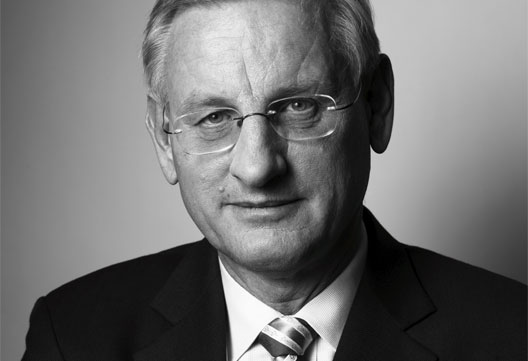
From Carl Bildt, Swedish Foreign Ministry: Since then [1523] – nearly half a millennium – Stockholm has been one of the very few European capitals where foreign forces of occupation and war have never set their foot. . . .
We survived the European turmoil of these centuries, partly by sheer luck, partly through some skill.
Our policy was a policy of staying aloof from the conflicts of our part of the world.
But two decades ago it all changed, and we entered a fundamentally new phase as we negotiated for accession to the European Union, laying to rest a long tradition of aspiring to neutrality in any conflict on the European continent, and seeking an active role in building new structures of cooperation, integration and security in our part of the world. . . .
These two decades have in many ways been enormously successful for Europe.
We saw the peaceful reunification of Germany. The three Baltic nations managed to restore their independence, and we were able to help in removing massive Soviet military facilities.
And gradually we saw the integration of the 100 million people from ten nations stretching from the Gulf of Finland down towards the Bosporus into the Euro-Atlantic security structures of the European Union and the Atlantic Alliance.
These were successes – and from them we can learn.
But there were also failures.
We had a decade of successive wars of Yugoslav dissolution from Slovenia in 1991 to the strife in Macedonia in 2001.
Two decades ago we sent the Swedish army into Bosnia, first under the command of the United Nations and then, after the Dayton Peace Agreement, under the flag of NATO, to help contain the forces of evil and contribute to stability in our own part of the world.
We could no longer be neutral.
We wanted to be part of the common efforts for security.
Since then, we have taken one step after the other.
During my time as Minister for Foreign Affairs alone, we have decided to send our army to Chad, our navy to the Gulf of Aden and our air force to Libya – all this in addition to previous heavy commitments in the Balkans and the Hindu Kush.
And we have just decided to take part in both the EU and the UN missions in Mali. The security and stability of the Sahel is part of the security and stability of Europe.
But we have learnt anew that peace is far more than just the absence of war – and that building a stable state is a far more complex, far more time-consuming and far more costly undertaking than the simple act of destroying one. . . .
[I]n this new age, much as we must work together on all the security challenges of state disintegration and state-building, we need our new armies also to reach out across the borders and boundaries and work together to protect these networks and flows.
And we also need to develop new structures and partnerships in all these areas.
As a nation in the forefront of developing all the opportunities of the new digital age, we must also be in the forefront of seeking new ways of cooperation to secure them for each and everyone.
Excerpts from remarks by Swedish Foreign Minister Carl Bildt at Strategic Military Partner Conference. (photo: Government of Sweden)
Image: sweden%206%2027%2013%20Bildt.jpg
